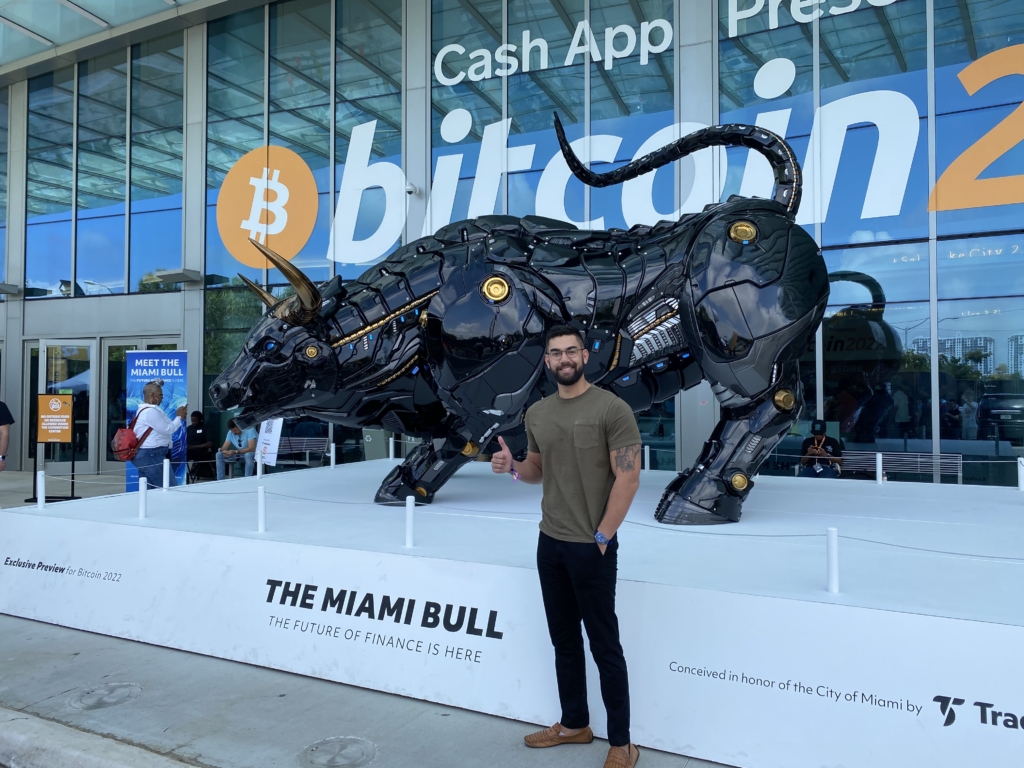
Christopher Newhouse, center, poses with the co-founders of Blockchain at Georgia Tech, Pruitt Martin and Cole Schendl. Courtesy photo
You co-founded the Blockchain Club at Georgia Tech. How did that come about, and what happens in the club?
In Summer 2021, I realized that Georgia Tech really didn’t have too much of a blockchain/crypto offering, and I realized that the professional network I was developing during my internship at Genesis was something I could leverage to bring back to campus and spread the word about opportunities in the space.
I messaged Professor Sudheer Chava, who teaches a blockchain/fintech course and is the director of our Master of Science in Quantitative and Computational Finance program, and he had told me about two other students (Pruitt Martin and Cole Schendl) who had a similar professional vision but didn’t really have the connections to the industry or space to build out the club from a professional standpoint.
The three of us met and had very similar ideas, and I knew from the start that they were just as passionate as I was. We knew this was an opportunity for Georgia Tech because national blockchain clubs were gaining publicity, but the publicity was mainly for the activity of the students – not necessarily their placement within the industry – nor were many of these clubs really focused too much on recruitment and raising awareness of the opportunities.
Georgia Tech is a top computer science program in the nation, but a lot of our talent was heading to “Web2” based jobs such as the companies within FAANG (Facebook, Amazon, Apple, Netflix, and Google) or Microsoft, and not necessarily to any of the newer Web3 based jobs that still had the ability to leverage their programming skills and knowledge.
The club is mainly focused around education and networking. We now have over 300 students involved, a handful of placements at some of the top industry firms (Genesis, GSR, Coinbase, start-ups, etc.), and an active newsletter written by students. We have a crypto-course we put out each semester that helps students learn more about the basics of blockchain technology and cryptocurrencies, and we are a project focused club that helps students gain hands-on experience in the industry.
Why was Georgia Tech a good environment for this type of club?
One of the biggest reasons we thought Georgia Tech was going to be a huge opportunity in terms of a talent base is just the fact that our school and university has always been open to innovation, and most of our students come with engineering and computer science backgrounds. Blockchain and cryptocurrency technology has always leveraged cryptography as well as various other topics within computer science and math, and there’s always been an entrepreneurial aspect on campus between our start-up organization (Create-X) and some of our other student-led organizations (GT Venture Capital Club).
Combining the technical skills of our students with the passion for entrepreneurially focused ventures led to the massive success of the Blockchain Club. Cryptocurrency and blockchain technology are only recently the recipient of pent-up demand from large-scale institutions, and most of the companies within the industry have parallels to the start-up culture in Silicon Valley. Georgia Tech has been a top environment for these kinds of student personalities and something like this is a no-brainer for students and faculty to be supporting and involved in.
Why are blockchain, crypto, etc., important sectors for Georgia Tech, in your opinion?
Georgia Tech needs to stay ahead of the game in terms of offerings for students. The crypto industry is growing at such a rapid pace and the fact of the matter is these opportunities for students are leveraging skills that students at Georgia Tech as well as other universities might already have. The difference between Georgia Tech and some of the other universities is that we’ve already started to build out recruitment pipelines and open up discussion to bring these crypto/blockchain firms to speak, recruit, and support the growth and career aspirations of our students.
I was previously an intern at Genesis and now students from Georgia Tech’s Blockchain Club make up a third of Genesis interns. (They are also a direct partner with our organization and provide us a check for $15,000 to sponsor conference travel and educational resources.) I was the only full-time recipient of an offer at GSR and now there are discussions of GSR being potentially interested in recruiting directly from our school.
With Blockchain and Cryptocurrency looking to be involved in the future of finance and technology, Georgia Tech needs to lean on its entrepreneurial and ambitious students and continue to foster creativity and innovation. These organizations are all student-led and organized, and Georgia Tech has been an incredible ground for students to take ownership and responsibility of growing the next projects and ideas in the space.

Christopher Newhouse poses in front of the bull at the Bitcoin Conference in Miami as a Georgia Tech undergrad.
We hear you’re planning a Web3/Crypto conference in Atlanta this fall. Tell us about that.
This is something currently in the works. We are planning on inviting a variety of companies and discussing partnership and sponsor opportunities with firms such as Binance, Coinbase, FTX.US, and others. We plan on hosting a panel/speaker series, recruitment events, web3/crypto chats, and opening this to students as well as the web3/crypto ATL community.
This is something that will be based in Atlanta around Georgia Tech’s campus and directly planned and hosted by GT Blockchain and two other web3 based Atlanta organizations. There isn’t really anything like it or up to the size we’re planning on having really anywhere in the Southeast, and it’ll directly be tied to Georgia Tech’s name. We’re hoping this conference will be a big contributor to massive placement in the industry this year, as a list of organizations have agreed to speak or be involved with our event. (For details, watch the GT Blockchain site.)
You said crypto is less of an unknown than in 2017, but it grabbed some headlines this year with rather sharp declines in Bitcoin and other currencies. What do you say to students who might be a bit spooked right now?
This one is a bit easier for me to answer after the past few years, and I can do it with a few counter-headlines because this is something I get a lot. In 2017, the industry was very retail driven and retail focused. Now, it’s a complete flip and institutions have gotten involved. This industry has been draining the traditional finance/tech firms of some of their best and brightest minds, and now has over $36 billion of Venture Capital funding behind it. There is nothing more to say now other than some of the smartest people in the world now have almost an endless amount of venture funding and are building the next financial systems and internet. Several of the traditional giants who have said crypto was too risky or laughable in the past and flipped their switches.
If Ken Griffin is admitting he’s wrong, Goldman Sachs has an entire crypto division and is partnering with Galaxy Digital to offer products, Blackrock is partnering with Coinbase, Brevan Howard is raising a $1 billion hedge fund for digital assets, traders at tradfi firms are leaving for crypto startups, and now graduates are choosing crypto roles over traditional roles, it’s here to stay.
On the off chance it isn’t, most of these roles are in business development, venture capital, trading, and software roles. It isn’t a new skillset you’re sinking four years of university into developing and marketing. If crypto were to fail, it’s just another asset class for me; The fundamental options and finance knowledge I learned to get this role will still be applicable at any other firm.
What will you be doing this fall?
I graduated in May 2022 as a Computational Biology major with a concentration in business. My connection to Georgia Tech is as an alum, but more importantly as the initial Founder of the Quantitative Trading Club, Co-Founder of the Blockchain Club, and first chosen executive member for the Venture Capital Club (Head of Research: Crypto).
Now, I stay directly involved with the Blockchain and Trading Clubs as the Head of the Alumni Advisory board where we hope to continue to feed more future club alumni as they graduate. I also stay closely in touch with Professor Chava, the advisor, to see if there is anything I can do to ensure the legacy of these clubs continues after my graduation.
In the fall, I will be working with my current company to be directly involved with the recruiting process, speaking directly to the Trading Club and Blockchain Club as an industry professional now, and staying involved in Mentor Jackets, a Georgia-Tech specific mentorship program that connects students from our university to alumni in the professional workspace. I’ll also be working with the next president of the Trading Club to develop a more targeted and tailored alumni mentorship program. I was there to help get these organizations off the ground and put in countless hours to ensure success during the first year, and I will be staying as involved as possible to help continue their success.
I’ve always wanted to help students learn more about the space, and I have a soft spot for students similar to myself who may have had a non-traditional path who are still interested in finance. I know sometimes quantitative finance and trading might not be the most fulfilling careers in terms of giving back to society, but I get my enjoyment and satisfaction from at least knowing I am making a difference to students who have questions about the space and want to speak more.
DON’T MISS: UNDER THE RADAR: AT BUCKNELL’S FREEMAN COLLEGE, A FRUITFUL MARRIAGE OF BUSINESS & LIBERAL ARTS and DEAN RONALD ANDERSON ON WHAT’S NEXT FOR TEMPLE FOX SCHOOL OF BUSINESS











Questions about this article? Email us or leave a comment below.